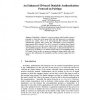127 search results - page 14 / 26 » Proving Properties of Security Protocols by Induction |
IFIP
2004
Springer
15 years 5 months ago
2004
Springer
The most studied property, secrecy, is not always sufficient to prove the security of a protocol. Other properties such as anonymity, privacy or opacity could be useful. Here, we u...
CSFW
2010
IEEE
15 years 3 months ago
2010
IEEE
—Zero-knowledge proofs have a vast applicability in the domain of cryptography, stemming from the fact that they can be used to force potentially malicious parties to abide by th...
126
click to vote
ENTCS
2007
14 years 11 months ago
2007
Designing secure protocols over ad-hoc networks has proved to be a very challenging task, due to various features of such networks, such as partial connectivity, node mobility, an...
CCS
2006
ACM
15 years 3 months ago
2006
ACM
We extend the definitional work of Dwork, Naor and Sahai from deniable authentication to deniable key-exchange protocols. We then use these definitions to prove the deniability fe...
ICCSA
2007
Springer
15 years 5 months ago
2007
Springer
Deniability is defined as a privacy property which enables protocol principals to deny their involvement after they had taken part in a particular protocol run. Lately, Chou et al....

